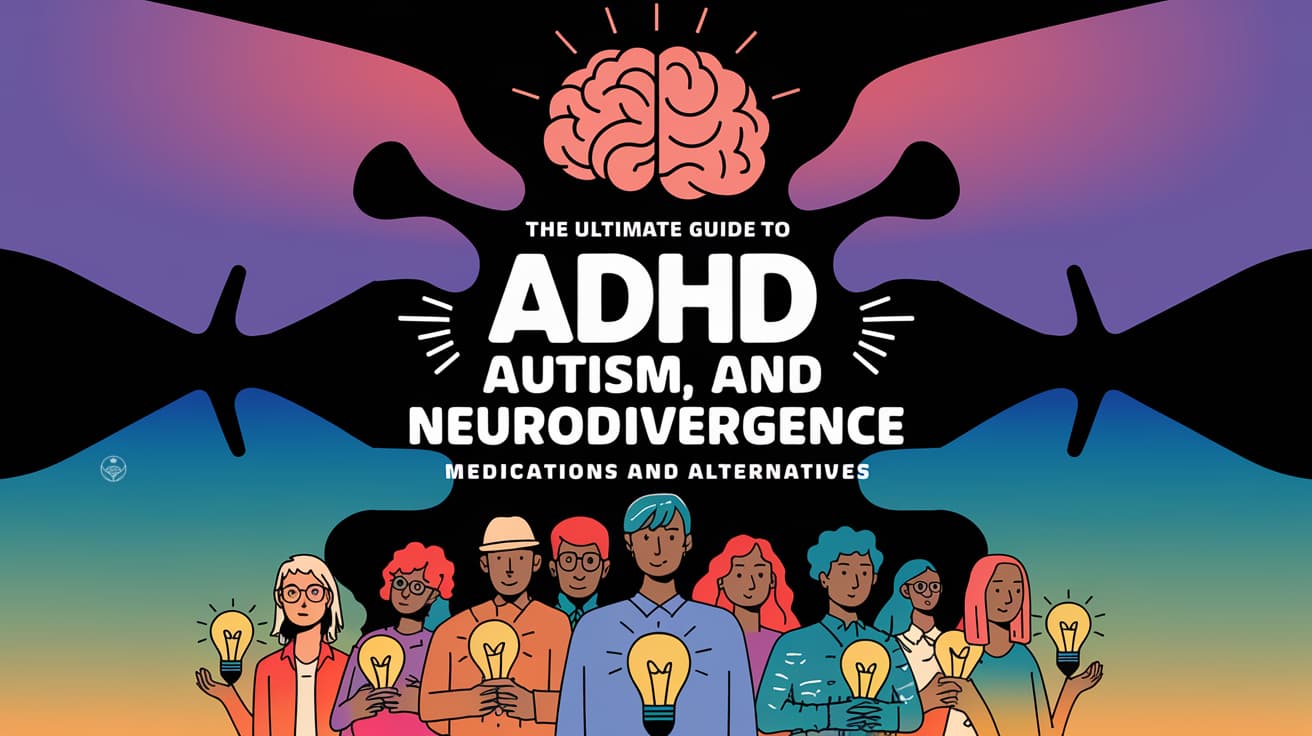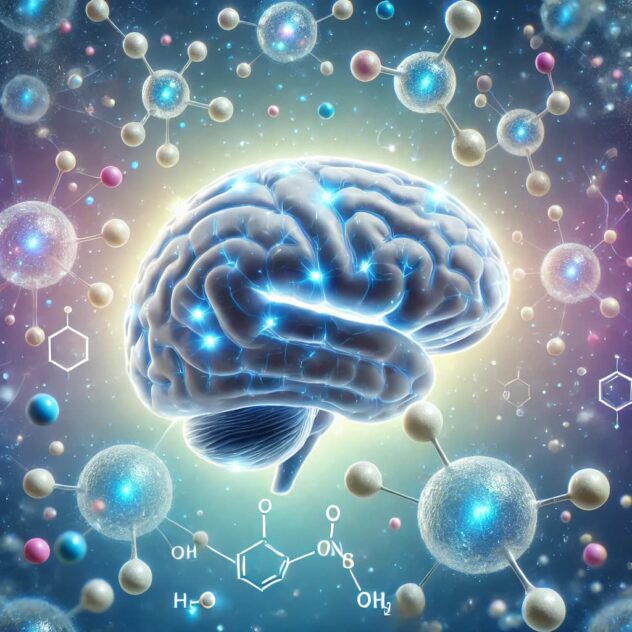
The Ultimate Guide to ADHD, Autism, and Neurodivergence Medications and Alternatives
Managing neurodivergence often feels like assembling IKEA furniture without the instructions, and maybe with a few screws missing. While medications can be a game-changer, they’re not a one-size-fits-all solution. For many, it’s about finding the right balance between managing symptoms and minimising side effects, all while exploring alternatives that can either replace or complement traditional treatments. For ADHD, Autism, Dyslexia and other types of neurodivergence, finding the right medications and alternatives can make a world of difference.
This guide dives into the wide world of medications for ADHD, Autism, and other neurodivergent traits, exploring their benefits, side effects, and potential offsets. We’ll also explore how alternative therapies can complement traditional treatments, helping you make informed choices that support both your brain and body.
ADHD: Finding Focus in the Chaos
Medications and Alternatives for ADHD
- Stimulants: These are the most prescribed for ADHD and work by increasing dopamine and norepinephrine levels, helping with focus and impulse control.
- Examples: Ritalin, Adderall, Vyvanse, Concerta
- Used For: Improving attention, reducing hyperactivity, and managing impulsivity.
- Possible Side Effects: Insomnia, decreased appetite, irritability, increased heart rate, and sometimes that dreaded afternoon crash.
- Non-Stimulants: A gentler option for those who can’t tolerate stimulants. They work more gradually to regulate brain activity.
- Examples: Strattera (atomoxetine), Intuniv (guanfacine), Kapvay (clonidine)
- Used For: Supporting focus and reducing anxiety or hyperactivity.
- Possible Side Effects: Fatigue, dizziness, upset stomach, and low blood pressure.
Complementary and Alternative Strategies for ADHD
- To Offset Side Effects:
- Insomnia? Try melatonin or a strict bedtime routine.
- Loss of appetite? Pack in calorie-dense snacks like smoothies or nut butters.
- To Complement Medication:
- Supplements like Omega-3s or Vitamin D.
- Mindfulness practices like meditation or yoga.
- To Consider Before or Instead of Medication:
- Cognitive Behavioural Therapy (CBT) for practical strategies to manage symptoms.
- Physical activity, especially aerobic exercise, to boost focus naturally.
Autism: Supporting Unique Needs
Medications for Autism
- Antipsychotics: Often used for managing severe irritability or aggressive behaviours.
- Examples: Risperdal (risperidone), Abilify (aripiprazole)
- Used For: Calming intense emotional outbursts or self-injurious behaviours.
- Possible Side Effects: Weight gain, sedation, and metabolic changes.
- SSRIs (Selective Serotonin Reuptake Inhibitors): Antidepressants, prescribed to address co-occurring anxiety or depression.
- Examples: Prozac, Zoloft
- Used For: Regulating mood and reducing anxiety.
- Possible Side Effects: Nausea, insomnia, and in adults, potential sexual dysfunction.
Complementary and Alternative Strategies for Autism
- To Offset Side Effects:
- Weight gain? Add regular movement like sensory-friendly yoga.
- Fatigue? Time medications closer to bedtime.
- To Complement Medication:
- Sensory integration therapy for managing sensory sensitivities.
- Gut health strategies, like adding probiotics, to support mood and behaviour.
- To Consider Before or Instead of Medication:
- Applied Behavioural Analysis (ABA) for structured skill-building.
- Communication tools like speech therapy or assistive devices.
Dyslexia: Beyond Words
Dyslexia isn’t often associated with medication, but it can be accompanied by anxiety or ADHD, which may require treatment.
Unlock peak brain performance with science-backed biohacks. Join free now & get your guide for just £4.99 (45% off)!

Medications for Dyslexia-Related Conditions
- For ADHD (if present): Stimulants or non-stimulants as discussed earlier.
- For Anxiety or Depression: SSRIs or therapy-based approaches.
Complementary and Alternative Strategies for Dyslexia
- To Complement Therapy:
- Assistive technologies like text-to-speech software or dyslexia-friendly fonts.
- Multisensory reading programs (e.g., Orton-Gillingham).
- To Offset Stress or Frustration:
- Mindfulness exercises to build resilience.
- Brain-training games to enhance processing speed.
- To Explore Instead of Medication:
- Educational therapies targeting phonemic awareness.
Other Neurodivergences: Broadening the Lens
Tourette Syndrome
- Medications: Antipsychotics like Haldol or Abilify, or alpha-adrenergic agonists like clonidine.
- Complementary Strategies: Behavioural therapy or mindfulness techniques to reduce tic severity.
Dyspraxia
- Medications: None specific, though co-occurring conditions like ADHD may require treatment.
- Complementary Strategies: Occupational therapy to improve motor skills, and adaptive physical education programs.
Executive Dysfunction (across neurodivergence)
- Medications: ADHD medications may help if focus is a key issue.
- Complementary Strategies: Time management tools, organisational apps, and CBT for planning skills.
The Gut-Brain Connection
Don’t underestimate the role of gut health in managing neurodivergence. The gut-brain axis influences mood, focus, and even behaviour.
- Probiotics: Found in fermented foods like yogurt or supplements.
- Fibre-Rich Foods: Support gut microbiota with whole grains and vegetables.
- Hydration: Essential for brain function and overall health.
Bringing It All Together
When it comes to managing ADHD, Autism, Dyslexia, and other neurodivergent traits, there isn’t one solution for everyone. While medication may play a role for some, our ethos at Herbal Biohacker focuses on empowering neurodivergent individuals with knowledge, tools, and alternative solutions to thrive naturally.
By exploring complementary therapies, lifestyle adjustments, and gut health strategies, you can uncover approaches that work with your unique brain. It’s not about masking neurodivergence but embracing it, transforming challenges into superpowers.
Ultimately, it’s about working with healthcare professionals to create a personalised plan that aligns with your values and goals, enabling you to live a thriving, authentic life.
Join Our Community
At Herbal Biohacker, we celebrate neurodivergence in all its forms. Join our Herbal Biohacker Community to share experiences, discover practical strategies, and connect with others navigating the same journey. Together, let’s redefine what thriving with neurodivergence looks like.






